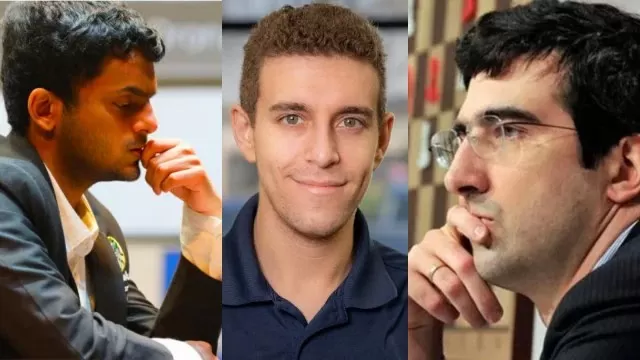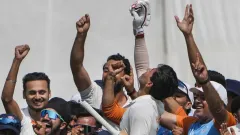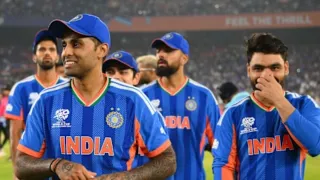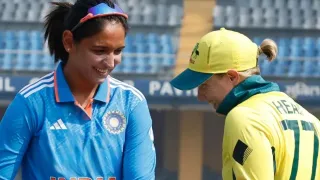The chess world is reeling after the sudden death of American Grandmaster and New York Times columnist Daniel Naroditsky at the age of 29. A prodigy who became a Grandmaster at 18, Naroditsky had inspired many with his talent and passion for chess. His untimely passing has ignited debates over the pressures faced by elite players, particularly in the online chess space. Indian GM Nihal Sarin, who was Naroditsky’s last opponent on chess.com, attributes the immense stress the American endured to repeated public accusations of cheating by former world champion Vladimir Kramnik—allegations that Naroditsky consistently denied.
Sarin, an accomplished blitz chess player himself, revealed that Naroditsky spoke candidly about the intense mental strain he was under during their final interactions. “His last games were against me. We played a bit in the morning and then again at night. He mentioned he was under immense stress because of baseless accusations—headed by Kramnik,” said Sarin. The Indian GM emphasized that despite Naroditsky’s apparent resilience, the psychological impact of persistent public scrutiny had become overwhelming.
While acknowledging Kramnik’s status as one of the greatest players of all time, Nihal expressed concern over the approach he adopted to combat cheating allegations. “He’s a world champion, no doubt. But the harm he’s causing these days is alarming,” Sarin said, noting that public accusations can deeply affect mental health, especially when the accused lacks sufficient support.
Last Games and Conversations with Naroditsky
Nihal Sarin shared insights into his final interactions with Naroditsky on chess.com. The pair played over 2,000 games online, and in their last face-off, Naroditsky appeared visibly stressed. “We were talking about a few things. He said he was under immense stress due to a lot of baseless accusations, headed by Kramnik. Apparently, a few others also joined in,” Sarin recalled. These conversations reveal the personal toll that public scrutiny can have on professional players, even those of great skill and experience.
The emotional weight of the accusations left Naroditsky feeling isolated, according to Sarin. Unlike Sarin, who had friends and coaches defending him during similar allegations, Naroditsky did not have a robust support system in place. This isolation, combined with the relentless public focus on his every move online, contributed to the psychological pressure that he struggled to manage.
Kramnik’s Role and Controversy
Sarin criticized the methods employed by Kramnik in pursuing cheating allegations. “Cheating in chess is a huge problem, but what Kramnik does is completely unacceptable. He blurts out accusations every day… you burn down a city to catch a few cheaters,” Sarin said. This approach, Sarin argued, can unjustly harm innocent players and has far-reaching implications for the mental well-being of the chess community.
He pointed out that such public accusations, especially when repeated by influential figures, create immense pressure on players. Naroditsky, already a highly skilled and dedicated competitor, faced accusations that affected his emotional state. Sarin highlighted that Kramnik’s actions, even if intended to maintain integrity in chess, have had unintended consequences for players’ lives.
Impact on the Chess Community
The news of Naroditsky’s death has shaken the global chess community. The Charlotte Chess Center, where Naroditsky trained and taught, described him as a “beloved member of the chess community” and praised his passion and inspiration. Fellow players, fans, and organizations have expressed shock and sorrow, underlining the significance of mental health support for chess professionals facing public scrutiny.
Kramnik’s comments even after Naroditsky’s death, hinting at substance abuse and mental health concerns, fueled further controversy. Sarin criticized these remarks, arguing that such statements can exacerbate stress for other players, like Czech GM David Navara, who has also faced similar public accusations. This situation highlights the fragile line between maintaining game integrity and ensuring the well-being of players.
Nihal Sarin’s Personal Experience
Sharing his own experiences with cheating allegations, Sarin emphasized the importance of having a strong support system. “Fortunately for me, my friends and coaches defended me immediately. Naroditsky did not have that. He faced everything almost alone,” he said. His statements illustrate how critical support networks are for players dealing with intense online scrutiny and false accusations.
Sarin also stressed that accusations should be handled responsibly. “Kramnik’s methods are like burning down a city to catch a few cheaters. You kill a thousand innocent people to catch one or two,” he said. This metaphor underscores the potential for disproportionate harm when influential figures publicly target individuals without proper investigation or process.
Call for Accountability and Sanctions
Nihal Sarin has called for accountability regarding Kramnik’s conduct. “I sincerely hope that Kramnik gets some big sanctions. He really needs to pay for what he’s doing to others,” Sarin said, highlighting the psychological impact of persistent accusations. He stressed that players like David Navara have suffered significant emotional distress due to similar targeting, even reaching out to FIDE for action with little response.
He also reflected emotionally on Naroditsky’s integrity, questioning the logic behind allegations of cheating against such a dedicated player. “Why would somebody like Naroditsky cheat? I cannot process how messed up some of these minds are. What do you get from ruining anyone’s life?” Sarin said. His remarks bring attention to the ethical responsibility of influential figures within the chess world to consider the human consequences of their actions.
Lessons for the Chess Community
Naroditsky’s death serves as a stark reminder of the pressures faced by professional chess players, particularly in the online arena. It highlights the need for mental health support, responsible conduct by influential figures, and structured processes for handling cheating allegations. The incident underscores how even the most talented and resilient players can be deeply affected by sustained public scrutiny.
The chess community must learn from this tragedy to ensure the safety and well-being of its members. Players, coaches, and organizations are being urged to provide support and implement safeguards against online harassment and unverified accusations. Maintaining the integrity of the game is important, but not at the expense of human lives and mental health.
Remembering Daniel Naroditsky
Despite the controversy surrounding his final days, Daniel Naroditsky will be remembered for his immense contribution to chess, his passion for teaching, and the inspiration he provided to countless young players worldwide. His talent, dedication, and love for the game left a lasting mark on the chess world, and his legacy continues to resonate with fans and professionals alike.
Nihal Sarin’s reflections on Naroditsky’s life and struggles bring a personal perspective to the tragedy, reminding the chess world of the human stories behind competitive play. The community is now faced with the challenge of balancing competitive integrity with empathy, compassion, and mental health awareness, ensuring such tragedies do not occur again.
Also Read: Lakshya Sen Stunned by Nhat Nguyen in French Open Exit!


Disclaimer
Possible11 is a sports news and analysis platform designed purely for entertainment and educational purposes. All match previews, player insights, and team analyses are based on publicly available information and expert opinions. We do not promote or support betting, gambling, or real-money gaming in any form. Users are encouraged to enjoy our content responsibly and use it for informational purposes only.





















Give Your Feedback